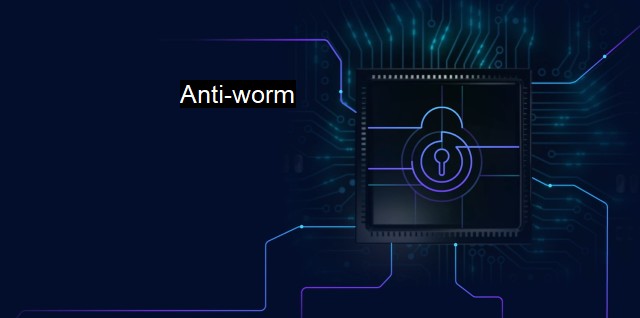What is Anti-worm?
Defending Against Computer Worms: Understanding Anti-Worm Strategies in Cybersecurity and Antivirus
"Anti-worm" plays a significant role in the protection of computer systems. It is vital first to understand what a worm is. A worm is a type of malicious software program, or malware, that self-replicates and disseminates itself to other connected systems autonomously or via networks without requiring immediate user interaction. Their self-propagating nature sets worms apart from other types of malware, like trojans or viruses, making them particularly menacing threats in the cybersecurity landscape. Given the high potential these malware have for causing significant damage to computers or networks, it becomes imperative to have mechanisms for combating them, and this is where anti-worm capabilities come in.Anti-worm refers to software or technologies designed to detect, prevent, and remove worms. Due to the unique characterisation of worms, anti-worm software is particularly designed to cope with their self-replicating nature and their ability to exploit system or software vulnerabilities. Not limited to identifying and eliminating worms after infecting a system, anti-worm software tends to guard systems preemptively, scanning for potential weaknesses an attacker may exploit and either mend or shield these frailties.
Central to the operation of anti-worm software is signature-based detection. every worm has a distinctive signature, which is a collection of identifiable features unique to it. Signature-based detection works by scanning computer files for these known signatures, offering a comparison between the file attributes and that of known worm malware. When a match-up is found, the anti-worm software then proceeds to neutralise the threat either by quarantining or deleting the offending file. while effective, this means of worm detection can only deal with identified and existing threats, leaving computers vu1lnerable to new, unknown worms.
To counter unseen threats, anti-worm software incorporates anomaly-based detection, a technique that focuses on the behaviour rather than signatures. This method involves defining a set standard of a 'normal' system or network behaviour. Violations from this baseline such as sudden spikes in network traffic or excessively high consumption of computational resources may trigger alerts to possible worm intrusion. By combining both these approaches – signature-based and anomaly-based – anti-worm software endeavours to give a comprehensive framework that accounts for both known and potential threats.
Having anti-worm software is only one part of ensuring cybersecurity. Not running the most current version of an operating system, failing to adequately patch or update software, and poor network configuration are all instances that not only invite worm attacks but also are general security weaknesses.
It is also worth nothing that anti-worm tools aren't foolproof. New worms are continuously crafted, and some may evade detection until it's too late. That is why constant vigilance- ensuring software is updated, systems are adequately secured, and employing additional deterrent strategies (such as intrusion detection systems, firewalls, and safer online practices) are integral to a broader, more secured computer network.
The threat posed by worms in the cyber landscape is indeed formidable due to their self-replicating nature and their capacity to remotely exploit system vulnerabilities. Anti-worm technologies offer crucial defence against these threats by combining anomaly-based and signature-based detection modes to offer a comprehensive cover. While they provide significant protection, they should be complemented with other robust security practices, as that's the most promising strategy in the fight against an ever-evolving cyber threat environment.

Anti-worm FAQs
What is anti-worm software?
Anti-worm software is a type of cybersecurity software that is designed specifically to prevent and remove worm infections on computer systems. It works by detecting and removing worms from the system before they can cause any harm.How does anti-worm software differ from antivirus software?
Antivirus software is designed to detect and remove a wide range of malware, including viruses, Trojans, and worms. Anti-worm software, on the other hand, focuses specifically on preventing and removing worm infections. While antivirus software may also include anti-worm features, it is not always as effective as dedicated anti-worm software.What are the benefits of using anti-worm software?
Using anti-worm software can significantly reduce the risk of worm infections on your computer system. This can help to protect your personal and sensitive information from being stolen, and prevent your computer from being used as part of a larger botnet. Anti-worm software can also help to improve the overall performance and stability of your system, as worm infections can often cause system crashes and other issues.Do I need to use anti-worm software if I have antivirus software installed?
While antivirus software can help to protect your computer from a range of malware, including worms, it may not always be enough. Worms can be particularly difficult to detect and remove, and may require dedicated anti-worm software for effective protection. If you are concerned about worm infections on your computer, it is recommended to use both antivirus and anti-worm software for maximum protection.Related Topics
Malware prevention Vulnerability assessment Cyber threat intelligence Endpoint protection Intrusion detection
| | A | | | B | | | C | | | D | | | E | | | F | | | G | | | H | | | I | | | J | | | K | | | L | | | M | |
| | N | | | O | | | P | | | Q | | | R | | | S | | | T | | | U | | | V | | | W | | | X | | | Y | | | Z | |
| | 1 | | | 2 | | | 3 | | | 4 | | | 7 | | | 8 | | |||||||